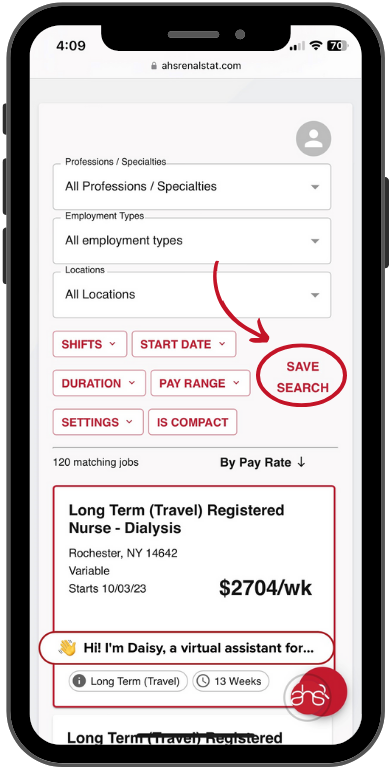As a dialysis nurse or technician, you understand the importance of good health and well-being when you find a travel dialysis job. You know that feeling tired all the time can put your job performance at risk and compromise patient safety.
Many of us in the healthcare industry have difficulty getting enough sleep due to hectic work schedules, shift work demands, and other obligations of day to day life. However, healthcare professionals such as yourself need to prioritize getting enough rest in order to provide quality care on a consistent basis.
In this post, we’ll discuss how to get sufficient sleep and rest while working in a travel dialysis job. Methods include recognizing personal boundaries, developing practice habits that promote regular sleep patterns, engaging in self-care activities when possible, and finding ways of managing stress levels.
At AHS RenalStat, we are here to support you when you find a dialysis job with us. Reach out to one of our recruiters to learn more about how we work with you every step of the way.
Recognize the Signs of Accumulating Fatigue
When working in a travel dialysis job, it’s important to anticipate signs of fatigue to prevent burnout. Your role demands versatility and adaptability, which can be mentally and emotionally exhausting. You may be learning to work in a new city with unfamiliar people all while dealing with the physical demands of packing, moving, and settling in.
All of these factors can add up and take a toll on your health, and getting poor sleep can make everything feel worse. By paying attention to warning signs like difficulty focusing, irritability, or lack of motivation, you can take proactive steps to rest and recharge, allowing you to perform at your best and enjoy your travels. Remember, self-care isn’t a luxury, it’s a necessity for any sustainable career path.

Make Your Bedroom a Familiar and Soothing Environment
As a travel dialysis professional, being in a new city can be exciting, but it can also be quite overwhelming. For many of us, sleeping soundly in a new place can be difficult. That’s why it is important to create a relaxing, comfortable environment in your bedroom to promote better sleep.
Incorporate familiar and soothing items into your new bedroom. This signals to your brain that it’s time to sleep and helps you feel more at ease in your new surroundings.
-
- Create a calming playlist of your favorite songs, quiet jazz, or acoustic guitar music to listen to before bed.
-
- Use a noise machine, which can generate pleasant white noise or nature sounds that aid in relaxation and sleep.
-
- Bring along scents that remind you of home. This could be in the form of scented plug-ins, essential oil diffusers, or even your favorite laundry detergent.
-
- Add a standing fan to not only help regulate room temperature but also provide a consistent, soothing sound.
-
- Consider using a weighted blanket, which can provide a sense of comfort and security.
-
- Always bring along your favorite pillow. The familiarity can aid in achieving a good night’s sleep.
-
- Use room-darkening devices such as curtains or eye masks. These can block out any unwanted light and help simulate your usual sleeping environment.
By incorporating these familiar touches, your new bedroom will quickly become a comfortable and soothing oasis that will help you get a great sleep after a busy shift at work.
Put Your Phone Away 30 Minutes Before Bedtime
We all know how important a good night’s sleep is for our physical and mental well-being. It plays a crucial role in our overall health and affects our mood, memory, and cognitive function. But did you know that the use of technology before bedtime can heavily impact the quality of our sleep?
Numerous studies have shown that the blue light emitted by electronic devices such as smartphones, tablets, and televisions can disrupt our body’s natural sleep-wake cycle. This blue light suppresses the production of melatonin, a hormone that regulates sleep, making it harder for us to fall asleep and stay asleep throughout the night.
To truly prioritize our sleep and ensure a restful night, it’s essential to set boundaries with technology. One effective strategy is to turn off the TV and put away your cell phone at least half an hour before bed. This will give your brain a chance to relax and reset, allowing for the natural release of melatonin and the promotion of deeper, more restful sleep.
By implementing these strategies and setting boundaries with technology, you can optimize your sleep environment and ensure that you wake up feeling rested, rejuvenated, and ready to take on the day with renewed energy and focus.
Find Strategies to Help You Adjust to Shift Changes
Working shifts that vary between day, evening, and night can disrupt your sleep patterns and leave you feeling groggy and unproductive. However, you don’t have to resign yourself to feeling tired all the time. There are strategies you can employ to help you fall asleep and stay asleep, no matter what shift you’re working.
One strategy is to follow the same routine to wind down and prepare for bed before going to sleep, whether it is 10 pm or 10 am. Just like our bodies automatically respond to the routine of waking up to an alarm, they can also be conditioned to respond to a bedtime routine. This routine acts as a signal, triggering your body to start producing sleep hormones and preparing for rest. The consistency of maintaining this routine, even if the actual bedtime varies due to shift work, can be instrumental in promoting healthy sleep habits.
Another strategy is to avoid caffeine after a certain time, as it can disrupt your sleep pattern. Generally, it’s recommended to stop consuming caffeine five hours before your anticipated bedtime. This will give your body enough time to process and eliminate the caffeine, allowing you to fall asleep more easily when it’s time for bed.
By finding strategies that work for you, you can successfully adjust to shift changes and maintain a consistent sleep routine when you find and work in a travel dialysis job.
Get Physical Activity Daily for Better Sleep
Regular physical activity plays a crucial role in keeping our body healthy and fit. Not only does it help us maintain our body weight and overall health, but it also has a significant impact on our sleep at night. Studies have consistently shown that people who engage in physical activities regularly tend to experience a better quality of sleep compared to those who don’t.
The benefits of exercise on sleep go beyond just being physically tired. When we exercise, our body temperature rises, and it takes some time for it to cool down after we finish. This post-exercise drop in body temperature promotes a deeper and more restful sleep. Additionally, regular exercise helps regulate our body’s natural sleep-wake cycle, making it easier to fall asleep and wake up at consistent times.
Exercise is also a powerful stress-reliever. When we engage in physical activity, our body releases endorphins, which are natural mood boosters. This helps reduce stress levels and anxiety, allowing us to unwind and relax more easily before bedtime. By incorporating exercise into our daily routine, we create a positive feedback loop where physical activity helps us sleep better, and better sleep enables us to perform better during our workouts.
So, if you want to experience the full benefits of a good night’s sleep for your travel dialysis job, consider adding some physical activity into your day-to-day routine. Whether it’s going for a run, practicing yoga, or simply taking a brisk walk, finding an activity that you enjoy and can stick to will make a significant difference in your sleep patterns and overall well-being.
Find Support for Your Travel Dialysis Job – AHS RenalStat
We have a passionate team of travel dialysis recruiters who are here to meet all of your needs throughout the process. From helping you find great opportunities to offering personalized advice and guidance regarding licenses and certifications, we are committed to supporting you personally and professionally.
Now is the perfect time to find a travel dialysis job. Contact a recruiter today!


